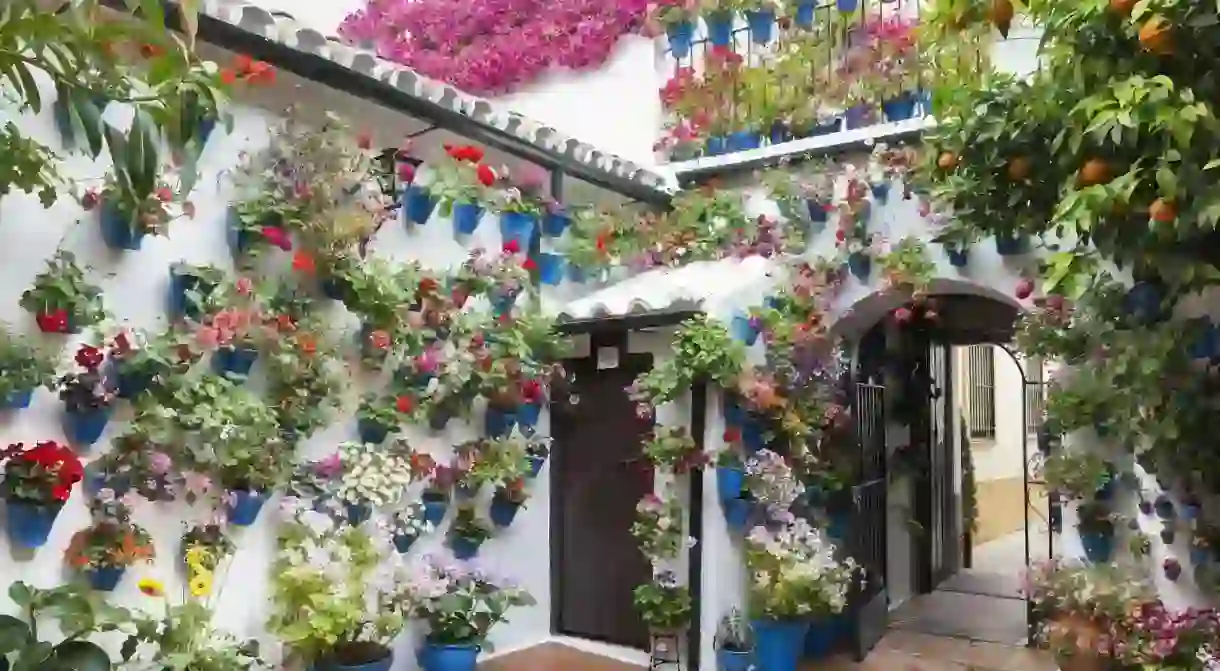A Brief Introduction To The Beautiful Patios Feria of Córdoba, Spain

Every May, the Andalusian town of Córdoba holds a competition for the prettiest patio or courtyard in the city, with the winner announced at the end of the month. The Feria de los Patios, as it is known, is now almost a hundred years old and is one of southern Spain’s most captivating events.
Aesthetically striking as they may be, the verdant patios and courtyards of Córdoba arose out of necessity. Córdoba is the hottest city in Europe during summer months – when temperatures frequently reach an insufferable 40 degrees celsius – so it has always been essential for its inhabitants to have a cool retreat for the hottest part of the day.
As far back as the Roman occupation of Córdoba, houses were built with an internal, open-aired atrium, which was protected from the sun on all sides by thick stone walls. Over the centuries, these havens of cool and shade were decorated with flowers, plants and fountains – a practice which was perfected and refined by the Moors when they captured the city in 711AD. In 1918, the city’s town hall officially launched the patios feria, offering an annual prize to the prettiest space. Except for a brief hiatus during Spain’s 1936-39 Civil War, it has remained a highlight of Córdoba’s cultural calendar ever since, with around fifty private homes opening up to the public every May. It is, without doubt, one of southern Spain’s most enchanting attractions, as UNESCO acknowledged when it declared the competition protected cultural patrimony in 2012.

Though the vast majority of Córdoba’s open patios belong to private homes, the centrepiece of the event is the opulent 15th century Palacio de Viana, a vast building used over the centuries as a residency for Spanish royalty. For an admission price of five euros, you can access all of Viana’s thirteen patios and gardens – intricately designed and aromatically populated with colourful plants, flowers and trees, these are some of Córdoba’s most gorgeous public spaces.
Their cultivation has taken centuries: the Patio of the Oranges, for example, served as the palace’s entrance in the 15th century (now it is the third courtyard you come to), whilst the Alhambra-like Patio of the Columns was only added in the 1980s as a space for events and celebrations (it’s now 6th in the running order). Allow a good hour to slowly wander around these scented, romantic spaces, peering in through the palace’s old windows as you go; another age of louche affluence and amorous intrigue, once played out amongst Viana’s orange trees and jasmines, comes instantly back to life.

After being seduced by Viana, you’ll be primed for the private patios. Don’t feel pressured to see them all (even spread over a weekend, forty or fifty would be overkill) but download a map, available from the feria’s official website, and wander around a few until you feel the need for some tapas and a cold beer coming on. Queues can be long, as only about ten or fifteen people are admitted at once, but they move quickly and entrance is free.
The patios are, quite simply, works of art. Designed, arranged and grown throughout the year, they are achingly romantic oases of cool and colour, where the placement of every bright-red pot of geraniums has been carefully thought out. Owners are often on hand and delighted to talk to you about the species of flowers and plants adorning the courtyards’ walls, and in some of the larger spaces live flamenco guitar is performed as you wander. How lucky these understandably proud hosts are to live in such places, you think: it would surely require quite an effort to have a bad day or suffer from the blues when your front garden is a UNESCO-protected paradise.














